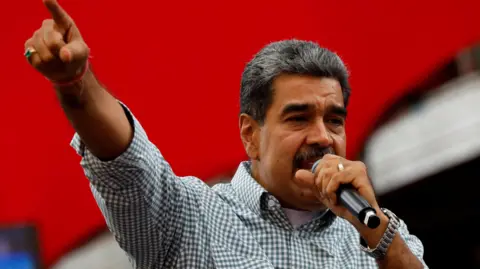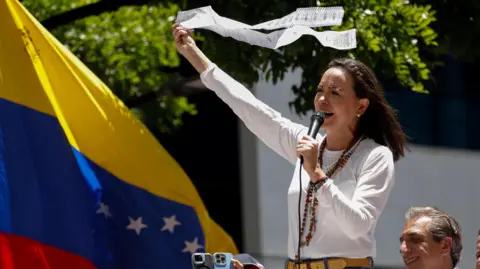US denies claim CIA plotted to kill Venezuela president
 Reuters
ReutersThe United States has dismissed claims made by Venezuela that the CIA plotted to assassinate President Nicolás Maduro and other top officials.
Three US citizens, two Spaniards and one Czech national have been arrested on suspicion of plotting to destabilise the country, the Venezuelan interior minister said.
Calling the detainees “mercenaries”, Interior Minister Diosdado Cabello claimed that the CIA was "leading the operation” and that hundreds of weapons had been seized.
The US rejected the claims, which come after Washington placed 16 senior Venezuelan government officials under sanctions, as "categorically false".
A spokesperson for the State Department said a US military member was being held and noted "unconfirmed reports of two additional US citizens detained in Venezuela".
Cabello responded by saying the detainees had contacted "French mercenaries" from Eastern Europe and were involved in "an operation to try to attack" Venezuela.
He added that "more than 400 rifles were seized" and accused the detainees of plotting "terrorist acts".
The Venezuelan government said the Spaniards detained were linked to Madrid's National Intelligence Centre (CNI).
Spanish government sources have told local media the pair do not belong to the intelligence organisation.
"Spain denies and categorically rejects any insinuation that it is involved in a political destabilisation operation in Venezuela," a source told AFP.
The Czech Republic has yet to react the claims.
In a news conference on Saturday, Cabello said: "The CIA is leading this operation, and that does not surprise us but they, the National Intelligence Centre of Spain, have always maintained a low profile knowing that the CIA operates in this area.
"These two detainees even tell us about a group of mercenaries they are looking for to bring to Venezuela with very clear objectives to assassinate President Nicolás Maduro, Vice President Delcy Rodríguez, myself, and another group of comrades who are leading our party and our revolution."
 Reuters
ReutersThe allegations come amid a feud between the Maduro government and both the US and Spain stemming from Maduro’s disputed victory in July’s presidential election.
Venezuela’s National Electoral Council (CNE), which is closely aligned with the government, declared Maduro the winner of the vote, but has not published detailed voting tallies.
Data published by the opposition suggests its candidate, Edmundo González, was the true winner.
On Thursday, Washington announced sanctions targeting "key officials involved in Maduro’s fraudulent and illegitimate claims of victory and his brutal crackdown on free expression following the election".
Following the detentions, a state department official said Washington "continues to support a democratic solution to the political crisis in Venezuela".
On Friday, Venezuelan Foreign Minister Yván Gil summoned the Spanish ambassador in Caracas after Spain’s defence minister, Margarita Robles, described the Venezuelan government as a “dictatorship”.
Gil said the comments were “insolent, meddling and rude” and indicated a “deterioration of relations between the two countries”.
It came days after González arrived in Spain to claim political asylum, a step that the overall leader of the Venezuela’s opposition, María Corina Machado, said he had taken "to preserve his freedom, his integrity and his life".
Spanish authorities have request more information about the detentions from Venezuela, and the Spanish embassy has requested access to the detainees.
Additional reporting by Ruth Comerford and Christy Cooney.
